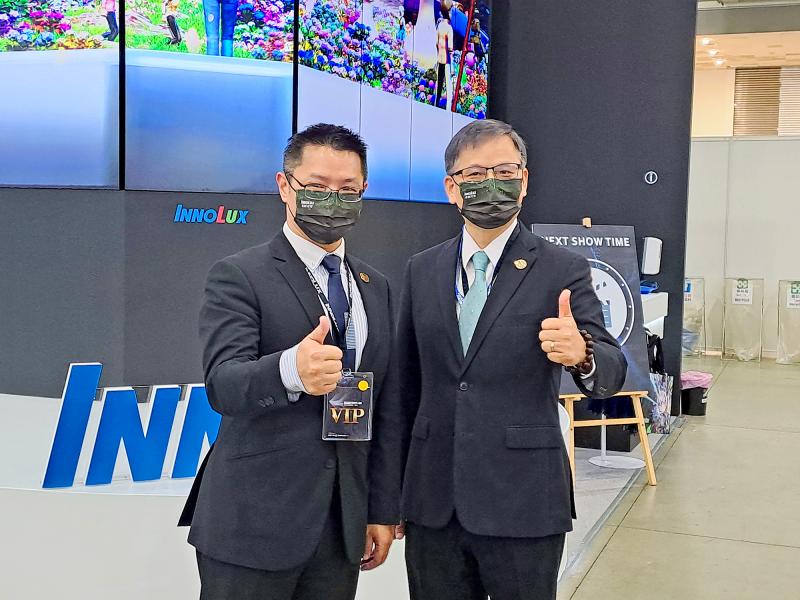Hon Hai Precision Industry Co (鴻海精密) yesterday said it would not send representatives to the board of flat-panel maker Innolux Corp (群創光電).
Hon Hai, known as Foxconn Technology Group (富士康科技集團) outside of Taiwan, said in a statement that its wholly owned subsidiary Hyield Venture Capital Co (鴻揚創投), which owns a 1.67 percent stake in Innolux, would not send any representatives to the flat-panel company as board members.
Following the announcement, Hon Hai shares rose 0.48 percent to NT$104.5, while Innolux shares fell 0.74 percent to close at NT$13.35 on the Taiwan Stock Exchange.

Photo: CNA
Innolux, which has proposed reducing its capital by 9.5 percent to NT$95.564 billion (US$3.21 billion), has scheduled an annual general meeting for June 24 to elect new board members and vote on the capital reduction plan.
Hyield Venture Capital has two representatives — James Yang (楊柱祥) and Ting Chin-lung (丁景隆) — on the Innolux board.
However, Hon Hai said that Yang and Ting, who have been renominated, would now represent themselves as individuals.
Despite Hon Hai founder Terry Gou (郭台銘) pouring substantial funds into the sector, Hon Hai said that it only owns a minority share in Innolux and has not made significant investments in the flat-panel business.
According to Innolux’s annual report for last year, Gou, Hyield Venture Capital and other Hon Hai affiliates collectively owned a nearly 6.8 percent stake in Innolux.
Innolux said in a separate statement that despite Hon Hai's exit from Innolux's board, Gou has shown support for the board nominees and will continue his backing of the company.
In addition to the nominations of Ting and Yang, Wang Jyh-chau (王志超), chairman of the Innolux Education Foundation, and Innolux chairman Jim Hung (洪進揚) were also renominated as board members.
Another five people have been nominated by Innolux as independent board members.
It will be the first time Hon Hai will be absent from Innolux's board since 2003, when the flat panel company was founded. Innolux then launched an initial public offering on the Taiwan Stock Exchange in 2006 and completed a merger with Chi Mei Optoelectronics Corp (奇美電子) and TPO Display Corp (統寶光電) in 2010, emerging as the surviving entity.

Zhang Yazhou was sitting in the passenger seat of her Tesla Model 3 when she said she heard her father’s panicked voice: The brakes do not work. Approaching a red light, her father swerved around two cars before plowing into a sport utility vehicle and a sedan, and crashing into a large concrete barrier. Stunned, Zhang gazed at the deflating airbag in front of her. She could never have imagined what was to come: Tesla Inc sued her for defamation for complaining publicly about the vehicles brakes — and won. A Chinese court ordered Zhang to pay more than US$23,000 in

Taiwan Semiconductor Manufacturing Co (TSMC, 台積電) yesterday held its first board of directors meeting in the US, at which it did not unveil any new US investments despite mounting tariff threats from US President Donald Trump. Trump has threatened to impose 100 percent tariffs on Taiwan-made chips, prompting market speculation that TSMC might consider boosting its chip capacity in the US or ramping up production of advanced chips such as those using a 2-nanometer technology process at its Arizona fabs ahead of schedule. Speculation also swirled that the chipmaker might consider building its own advanced packaging capacity in the US as part

‘NO DISRUPTION’: A US trade association said that it was ready to work with the US administration to streamline the program’s requirements and achieve shared goals The White House is seeking to renegotiate US CHIPS and Science Act awards and has signaled delays to some upcoming semiconductor disbursements, two sources familiar with the matter told reporters. The people, along with a third source, said that the new US administration is reviewing the projects awarded under the 2022 law, meant to boost US domestic semiconductor output with US$39 billion in subsidies. Washington plans to renegotiate some of the deals after assessing and changing current requirements, the sources said. The extent of the possible changes and how they would affect agreements already finalized was not immediately clear. It was not known

Taiwan Semiconductor Manufacturing Co (TSMC, 台積電) yesterday said that its investment plan in Arizona is going according to schedule, following a local media report claiming that the company is planning to break ground on its third wafer fab in the US in June. In a statement, TSMC said it does not comment on market speculation, but that its investments in Arizona are proceeding well. TSMC is investing more than US$65 billion in Arizona to build three advanced wafer fabs. The first one has started production using the 4-nanometer (nm) process, while the second one would start mass production using the